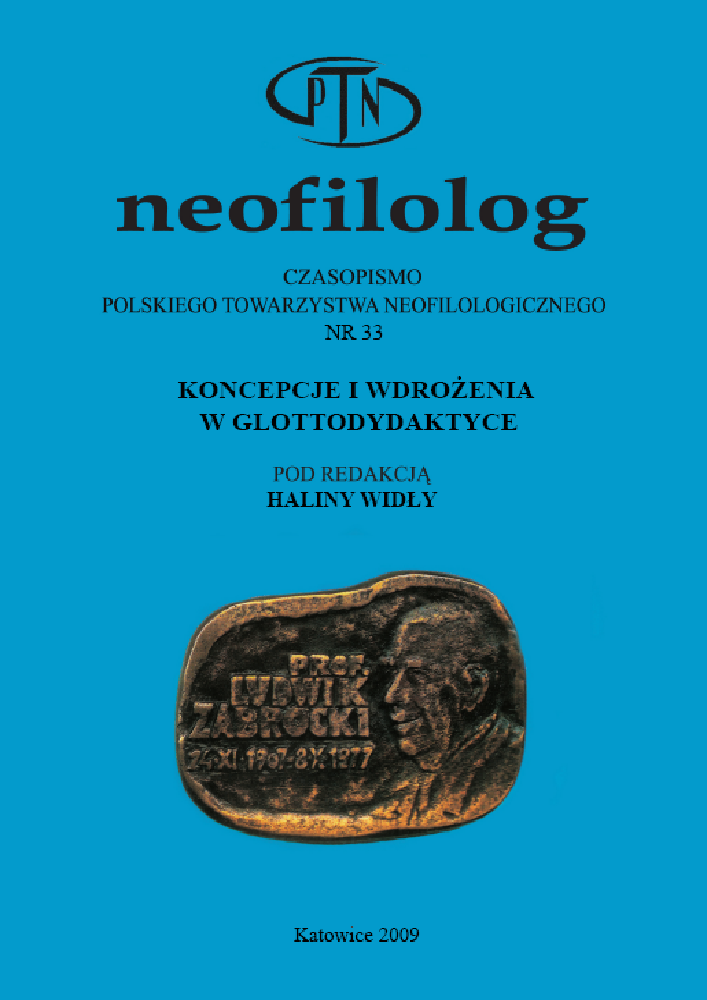Abstrakt
In contemporary literature foreign language ability is considered a dynamic concept, that is, subject to an evolutionary development in interaction with the environment and potentially trainable (Sternberg, 2002). Sternberg’s Triarchic Theory of Human Intelligence is based on an assumption that abilities are forms of developing expertise. An important educational implication of this statement is that abilities are flexible and pliable rather than fixed and that they can be taught. The purpose of the paper is to present results from the first stage of a longitudinal study of foreign language aptitude on a sample of English philology students. The goal of this study, conducted in cooperation with a psychologist, is to analyze the students’ cognitive abilities and establish whether they are subject to a dynamic change.
Bibliografia
Amerykańskie Towarzystwo Psychologiczne APA, 1985. Standardy dla testów stosowanych w psychologii i pedagogice, Biblioteka psychologa praktyka, tom 1. Warszawa: Pol. Tow. Psychol., Lab. Technik Diagnostycznych.
Baddeley, A. D. 2003. « Working memory and language: an overview ». Journal of communication disorders 36: 189 – 208.
Brzeziński, J., Hornowska, E. 2000. « Podstawowe metody badawcze – teoria i praktyka testowania » (w) Psychologia. Podręcznik akademicki, tom 1 (red. J. Strelau). Gdańsk: GWP.
Carroll, J. B. 1959. « Use of the Modern Language Aptitude Test in secondary schools ».Yearbook of the National Council on measurements used in education 16: 155 – 159.
Carroll, J. B. 1981. « Twenty-five years of research on foreign language aptitude » (w) Individual differences and universals in language learning aptitude (red. K. C. Diller). Rowley, M. A: Newbury House.
Carroll, J. B., Sapon S. 2002. Modern Language Aptitude Test. MLAT. Manual 2002 edition. N. Bethesda, Maryland: Second Language Testing, Inc.
Conway, A. R. A., Jarrold, Ch., Kane, M. J., Miyake, A., Towse, J. N. 2008. « Variation in working memory. An introduction » (w) Variation in working memory (red. A. R .A. Conway, Ch. Jarrold, M. J. Kane, A. Miyake, i J. N. Towse). Oxford: Oxford University Press.
Corno, L., Cronbach, L. J., Kupermintz, H., Lohman, D. F., Mandinach, E. B., Porteus, A. W., Talbert, J. E. 2002. « Remaking the concept of aptitude: Extending the legacy of Richard E. Snow ». Mahwah, NJ: Lawrence Erlbaum. International journal of bilingualism 11/4 : 391 – 409.
Daneman, M., Carpenter, P. 1980. « Individual differences in working memory and reading ». Journal of verbal learning and verbal behavior 19: 450 – 466.
Dörnyei, Z. 2005. The psychology of the language learner. Mahwah, NJ: Lawrence Erlbaum.
Ehrman, M. E. 2008. « Personality and good language learners ». (w) Lessons from good language learners (red. C. Griffiths). Cambridge: CUP.
Engle, R. W., Laughlin, J. E., Tuholski, S. W., Conway, A. R. A. 1999. « Working memory, short-term memory, and general fluid intelligence: a latent-variable approach ». Journal of experimental psychology: General, vol. 128/3: 309 – 331.
Goleman, D. 1996. Emotional Intelligence. New York: Bantam Books.
Grigorenko, E.L., Sternberg, R.J., Ehrman, M.E. 2000. « A theory based approach to the measurement of foreign language learning ability: the CANAL-F the-measurement of foreign language learning ability: the CANAL-F the-ory and test ». Modern language journal 84: 390 – 405.
Harrington, M., Sawyer, M. 1992. « L2 working memory, noticing interactional feedback and L2 development » (w) Individual differences and instructed language learning (red. P. Robinson). Philadelphia: John Benjamins Publishing Company.
McCrae, R. R., Costa, P. T. 2003. Personality in adulthood: a five-factor theory perspective. 2nd ed. New York: Guilford Press.
Miyake, A., Friedman, N. P. 1998. « Individual differences in second language proficiency: Working memory as language aptitude » (w) Foreign language learning (red. A. Healy i L. Bourne). Mahwah, NJ: Lawrence Erlbaum.
Osaka, M., Osaka, N., Groner, R. 1993. « Language-independent working memory: Evidence from German and French span tests ». Bulletin of the Psychonomic Society 31: 117 – 118.
Robinson, P. 2002. « Learning conditions, aptitude complexes and SLA: A framework for research and pedagogy » (w) Individual differences and instructed language learning (red. P. Robinson). Philadelphia: John Benjamins Publishing Company.
Robinson, P. 2007. « Aptitudes, abilities, contexts, and practice » (w) Practice in second language (red. R. M. DeKeyser). Cambridge: CUP.
Robinson, P. 2009. « Individual differences, aptitude complexes, SLA processes and aptitude test development » (w) Studies in pedagogy and fine arts. New perspectives on individual differences in language learning and teaching, vol. 8. (red. M. Pawlak). Poznań-Kalisz: Faculty of Pedagogy and Fine Arts in Kalisz Adam Mickiewicz University in Poznań.
Skehan, P. 1998. A cognitive approach to language learning. Oxford: Oxford University Press.
Skehan, P. 2002. « Theorising and updating aptitude » (w) Individual differences and instructed language learning (red. P. Robinson). Philadelphia: John Benjamins Publishing Company.
Sternberg, R. J. 1998. « Abilities are forms of developing expertise ». Educational researcher, vol. 27/3: 11 – 20.
Sternberg, R. J. 2002. « The theory of successful intelligence and its implications for language aptitude testing » (w) Individual differences and instructed language learning (red. P. Robinson). Philadelphia: John Benjamins Publishing Company.
Sternberg, R. J., Grigorenko, E. L. 2000. Dynamic testing: The nature and measurement of learning potential. New York: CUP.
Wojtowicz, M. 2006. Test zdolności językowych, TZJ .Warszawa: Pracownia Testów Psychologicznych PTP.
Licencja
Prawa autorskie (c) 1970 Adriana Biedroń

Utwór dostępny jest na licencji Creative Commons Uznanie autorstwa – Bez utworów zależnych 4.0 Międzynarodowe.
Przedstawiany utwór (artykuł) upubliczniany jest na podstawie umowy z autorem i na licencji Creative Commons Attribution-NoDerivatives 4.0 International (CC BY-ND 4.0).
Użytkownicy mają obowiązek podania wraz z rozpowszechnionym utworem, informacji o autorstwie, tytule, źródle (odnośniki do oryginalnego utworu, DOI) oraz samej licencji;
- bez tworzenia utworów zależnych,
- utwór musi być zachowany w oryginalnej postaci.
Uniwersytet im. Adama Mickiewicza w Poznaniu zachowuje prawo do czasopisma jako całości (układ, forma graficzna, tytuł, projekt okładki, logo itp.).
